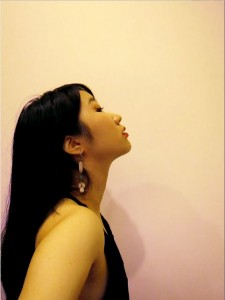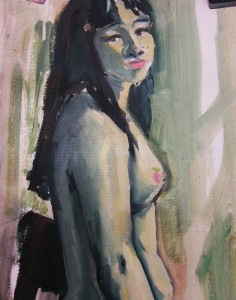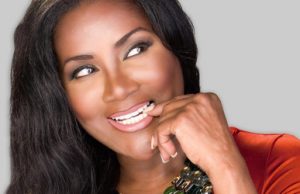COLLEGE FEMINISMS: getting naked
By Isabel Liu
He asks if he can draw me.
It’s a mid-April evening, finally warm enough for me to open the windows at night. We’re sitting up in my bed, trawling through a Google image search of magical realist paintings. My favorite is one where brilliant, Turkish-looking mosques are sailing away like hot air balloons, the thick coils that had grounded it to earth winding like the tentacles of a jellyfish, gripped by little people sprawled nakedly on the reluctant earth. His hand has slipped underneath the cinch of my sweatpants and is playing around the curve of my hip.
It’s an easy question.
“Yes.”
There is a poem called “Persimmons” by Lee Young-Li, where the speaker tells of undressing his lover in a moonlight yard where the grass is hung with dew. He teaches her Chinese – crickets, chiu chiu, but the word for “dew” he has forgotten; the word for “naked” he has forgotten. There is something a bit like regression in that act; in reciting the names of the things that one first learns when one is a child. There is also something to do with caressing the things that one knows in a new tongue, with a new tongue. The body of a new lover is at once unknown and known; there is a way in which every first encounter is unscripted and a way in which it reenacts the gestures and the gazes blocked out with other actors in previous bedrooms. I told him that I needed to forget the person who had last loved me, but in loving him with my body we resurrected the ghosts of all the lovers who had come before, who had taught us how to graze and nibble and swallow, who now crammed into the tininess of my dorm room and gazed hungrily at we who hungrily tried to absorb each other, envious for the lives we once shared.
The poem is also absorbed in the fantasy of silence that accompanies the sight of an uncovered body, of forgetting the names of the things one sees when astonished by the purity of what one sees, of words falling to muteness and the choate becoming inchoate, of flesh melding into flesh, of the boundaries of the self eliding, of everything dissolving. The first time I took a lover, I wept because I remembered the first time that I had been taken, before I learned to say yes. Later I wept again because I realized that I had been riding him the way that I had been ridden. It was like you couldn’t stop, he’d said, beneath the streetlight where we stopped and I hid my face in his neck. We didn’t feel connected.
Later, as we lie curled into each other in the dark of that mid-April evening, the laptop that had held the images of the Turkish mosques slumbering somewhere near our feet, I think of rain falling on an earth that had been crying for it.
My first foray into the realm of the bedroom was traumatic more than it was romantic. I came from a highly conservative evangelical Christian background, had a faith so limpid and rigid it was bound to break. He was a too-skinny hollow-eyed cage of battered emotions that to anyone else would’ve read “shit, deep shit” but to me, careening on the end of adolescence and still drunk on Jesus, he was my charge, my mission. My first love. I would save him from the insomnia, from the inability to eat, from the memories of a girl who had shipwrecked him into depression. I can’t hear Birdy’s cover of Bon Iver’s “Skinny Love” – the way that she throws out her voice and bays for her lover to c’mon, just last the year – without thinking of him. One night when we were cuddling after a movie he got on top of me without any preamble and started thrusting his hips into mine. I lay there like a blow-up doll, inert and speechless. After he was done, as a means of making it up to me, he asked me if he could kiss me. And I said yes, because I still loved him at that point. He kissed me once and said, “So now you know what it feels like.”
And that is the story behind my first kiss.
We somehow manage to hook up again after that. Suffice it to say that we were both pretty messed up and that I cried a lot. Like in some evangelical horror story, I lost my faith and my sexual purity in one blow. The apple was plucked and paradise was lost and I fell into bed again, too quickly, with someone who listened and held me when I wept. The moonlight coming through my bedroom window reminded me of bad things. Everything was a trigger. “So much memory,” I whispered. “I’m here,” he whispered back. He brushed his lips so lightly against mine that I hardly registered that he’d kissed me until it was over. I kissed him back and it was amazing to feel him kissing me back. And I didn’t cry. I laughed. I quoted Milan Kundera and he made fun of how nerdy I was, and when I drew breath again to blab about Andrew Marvell (“had we but world enough and time”) or Tom Stoppard channeling Oscar Wilde (“from his red rose-leaf lips comes music that fills me with joy”) or whoever the hell was tramping through my sex-drunk mind, high on kisses, he kissed me until I was breathless and broke away only to ask, mock-seriously, “So what is it you were telling me about Chaim Potok?”
I fell in love again. We spent six weeks at the beginning of summer together. I was still in love with him when he called me eight months later on my twenty-first birthday, which was also the one-year anniversary of my sexual assault, to say that he had started dating someone else and that by the way, she has the same birthday as you.
I am having lunch with a former professor a few months afterwards. I mention that I’m on a tight schedule, I have to be at the art building by one, because I’m going to be nude modeling. He asks me why.
I spin him some academic waffle about aesthetic nudity and about being a sitter who wants to find a way to gaze back as much as she is gazed at. My professor doesn’t look entirely convinced. I contemplate letting my story hemorrhage out of me, in brutal, caricature strokes – the assault, the trauma, the rebound, The Trauma 2.0.
But a year later I’m better at keeping my mouth shut. I don’t tell him that the guy who had called me not too long ago was the only person besides my mother who had ever seen me fully naked. Not even my assaulter had had that. My skin carried an imprint of every touch and every gaze. I wanted to break the distinction until it could no longer break me, until I could face all the memories that swarmed over me like flies at night, banish them in a single wave, enough.
“Do you draw every girl who comes in here?” I ask. I’m standing in the artist’s bedroom.
(Disclaimer: “The artist” is hardly an adequate epithet for him, but it’s the best and quickest way of preserving anonymity and insuring readability, always a concern among millennials who are narcissistic enough to think that other people give a fuck about who they fuck).
I’m naked – sorry, nude – and he’s shirtless. I’d stripped him of it in a mock attempt to make us more “equal.”
He chuckles. “Nah, I wish I had that kind of cred.”
When I tell my friends the story almost all of them respond by saying, “Oh my god, it’s like Titanic. You’re dating – oh right, you’re not dating – you’re fucking Leonardo DiCaprio.” No, darlings, it ain’t the Titanic. The Titanic was Kate Winslet draped seductively all over this divan, giving her best Mona Lisa smirk while a young DiCaprio fumbles with his charcoal and blushes when he starts shading in her breasts.
Instead, when posing for him I smile archly for around two minutes before I get bored and start yammering about, of all things, Sino-Japanese relations and about this writer who wrote a whole book about the Rape of Nanking and started researching for this other book in Southeast Asia with similarly traumatic subject matter and she eventually got so depressed that she put a bullet through her head.
“That’s terrible,” he says, absorbed in sketching my chin.
“Yeah,” I agree, feeling a bit terrible that part of Iris Chang’s legacy involves being bandied about in an overly cerebral round of verbal foreplay. I’ll show you my pain if you show me yours. How does anyone even begin to talk about stuff like that anyways? I told a friend over Facebook chat that I’d been assaulted and his response had been an emoticon. ( 0.0 )
“Can you stop talking for a bit? I’m drawing your mouth,” he says, and I shut up.
After maybe forty minutes of posing I get a cramp in my left leg and I wander over to him. “Don’t look,” he says, “I’m not done, it doesn’t look like you.” I look at myself, carefully etched in heavy paper. He’s only sketched the details of my face. The rest of my body is gestured at in a few descriptive lines. I am a bit surprised. I hadn’t realized I’d looked so sad.
I tell him about how I like it when people draw me and make me into their own thing. I bastardize Barthes and reference some line where he talks about the refuge of being an object. He snorts. This isn’t the first time I’m quoting Barthes. He slips the sketch of me where I am a disembodied head beneath his bed. I wonder how many naked girls are lying there, in his Bluebeard’s chamber of a crawl space. This one’s a lady killer and boy, does he know it. “I’ll write about you and you’ll draw me,” I say. “It’s a good deal.”
“It’s a great deal. You can objectify me,” he says, drawing me to his bed, “you can make me your thing,” and we do.
I don’t spend the night. I kiss his cheek before I go. “Thank you for sharing your body with me,” he says, very sweetly. I’d said the same thing to him earlier in the evening and he’d taken a shine to the line. It hurts a bit when I walk but otherwise I feel great. I feel strong. I feel like I can do this thing, or play this game, or whatever unsexy euphemism we’ve come up with to describe this naked grapple before we turn out to wake up in other beds, and not get hurt. For one of the first times since I received that phone call on my birthday, I don’t feel like somewhere inside of me there is a place that keeps howling.
I model for an introductory painting class at my college. In the studio, surrounded by grimy, tall-legged stools and jars of clouded water where paints find their murky deaths, where the dust of the cement floor marries my bare feet, I listen to myself discussed in the third person, in terms of my body. The professor is quizzing the class on my physical distinctions. It’s unnerving and wonderful to hear my body, which I have dragged through a decade-long ordeal of obliviousness, guilt, anxiety and ruthless diets, discussed with such objective remove. One girl offers that my shoulders are wider than my hips, something that I have never noticed. The professor agrees. I remember a short story I’d read where the girl only discovers her body in the moment that it is being discovered by someone else.
They take me and they make me their thing – anything they want, and I am theirs. There is a girl who makes everyone she paints look like an impressive alien version of themselves – elongated limbs with firm musculature, latticed with boldly colored stripes, posed against lurid backgrounds – she makes me blue, she makes me Avatar, she makes me look like emerald glass poured into the shape of a woman, triumphantly naked in an ochre sky, and I love her for it. There is another girl who really can’t paint that well, and I watched her struggle with her canvas. I watch her dab on a nipple, hesitate, and erase it. It elates me. I love the folding and unfolding of my body, that I had thought so pitiful, so meager in its range of contortions, so impoverished in the pleasure it proffered, blossom instead like a strange and newly discovered flower on thirteen canvases circled around me. For the first time I witness my body without any allusion to its history. It has no mother and no lovers. I feel like the center of an uncertain universe, orbited by floating refractions of my body, finally anonymous, finally free.
Later that night I slip back into the studio and take pictures of all the portraits that had been made of me. As I creep gingerly around the studio, marveling at the traces of me that winked back from every corner and every wall – the angle of my hip here, the scornful-looking sweep of my eyelids there, and ugh, I look like a monkey here – I think that this must be one of the most narcissistic things that I have ever done, although somehow, it is simultaneously one of the most self-celebratory things I have ever done.
But things don’t wind up well with the artist. I violate the number one dictate of hookup culture, which is I get attached. We’d talked about this before, the first time we hooked up. Emotions and sex don’t go together. (“How do you do it?” I’d asked. “I don’t know, how do you do it?” “I don’t. I’m terrible at it.”) I can’t make them not go together, when what’s driving me isn’t so much horniness (well, there’s that too) as some unspeakable need for absolution, something so good to come along that it will redeem everything I’ve been through. Tell me why rape happens. Tell me why the people you love turn on you. Tell me when all the pain ends. Tell me you can make it end.
I relive all those nights, fumbling over a rosary of regret.
I don’t know how to ask for what I want. I hide in words, one of the few places that I feel safe, invoking and inverting emotion and meaning as it suits me, spinning out an impossible game where I, like the people I sleep with, can never be pinned down. Can never be exposed, can never be vulnerable. Can never get naked. One of the last texts that he sends tells me to say it plain and to stop using code. I can’t play by these rules. We quit.
What gripped me about those Turkish mosques was the way that they floated, huge and beautiful and imperious, away, away, over seas studded with strange creatures and cities calcified in improbable architecture, while the naked people on the earth held out their arms, calling for them to stay, stay.
The girl in the portrait is standing, looking over her right shoulder at the viewer. Her gaze is soft; her mouth a dash of pink that blurs at the edges. Of all the portraits of me that were made by the class, this one is my favorite. She looks as though she’s turning from a window, but back to what, I’m not quite sure. A lover? An empty room? I can’t decide whether or not her eyes say regret. There is something about her that reminds me of paintings by American realist Edward Hopper, who painted several of women who are either standing or sitting naked, all of them staring out at wide windows. There she is on the edge of the bed, her lover naked and prone behind her, the storms gathering in the shadows. Post coitum omne animal triste est. Take a look at any Hopper and you’ll see that even more so than he was talented at rendering people, he was talented at rendering the spaces that yawn open between people, the inviolable chasms that surround each of them, swallowing every gaze and every caress, every word whispered in the dark that the dark will reclaim.
So much memory.
The first time after I slept with someone again after the assault, I stood half-dressed and gazed into the growing light of that spring morning where we had kissed and said see you later, and wrote him to say, “I feel like a Hopper, but without the loneliness and the desolation, which is to say: rather beautiful.” But what is a Hopper without the loneliness and desolation? The people in his portraits have wandered into their places from the streets, from the living room after dinner, from lovemaking. One often judges the merit of a painting from how pliable the figures are, how liquid their eyes, how ready they seem to spring to life. But there’s no urge to see or imagine the figures in Hopper’s paintings unfreezing themselves and continuing to tell their story. An icy dread sheathes each of his figures, foreclosing any premise of union. Even if he lifts his head from the pillow, if she uncrosses her arms, if he wraps his arm around her waist and pulls her back to him, what happens next is still inevitable.
They will mistake, they will misbelieve, and they will miss each other.
_____________________________________________
 Isabel Liu is the pen name of an English major at Williams College. She is a staff writer for the Williams Record, a senior editor for the Williams Telos, and a member of the college’s rape and sexual assault hotline. She became interested in issues surrounding female migration after a travel research fellowship on migrant brides in Southeast Asia and will be exploring the construction of sex trafficking narratives in her senior thesis.
Isabel Liu is the pen name of an English major at Williams College. She is a staff writer for the Williams Record, a senior editor for the Williams Telos, and a member of the college’s rape and sexual assault hotline. She became interested in issues surrounding female migration after a travel research fellowship on migrant brides in Southeast Asia and will be exploring the construction of sex trafficking narratives in her senior thesis.





12 Comments